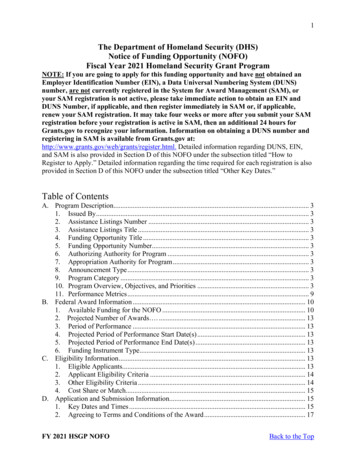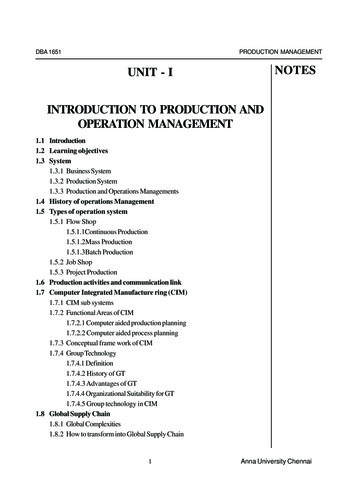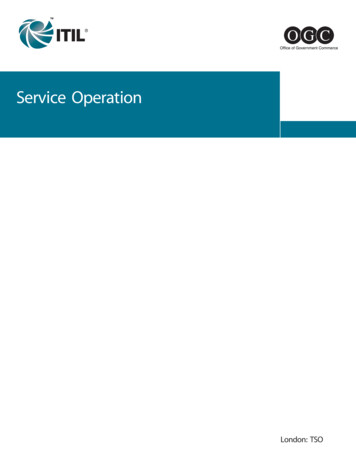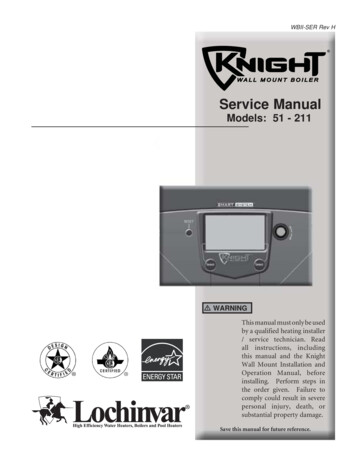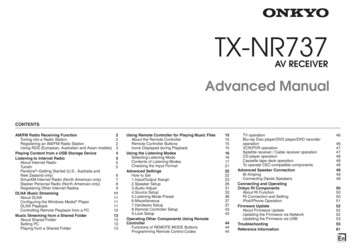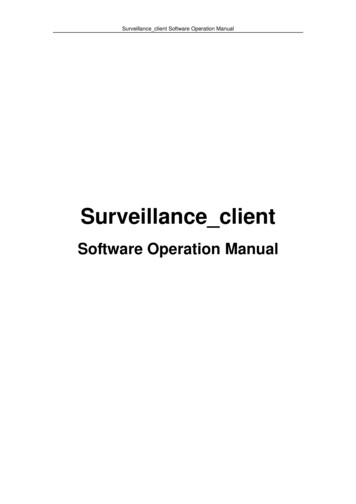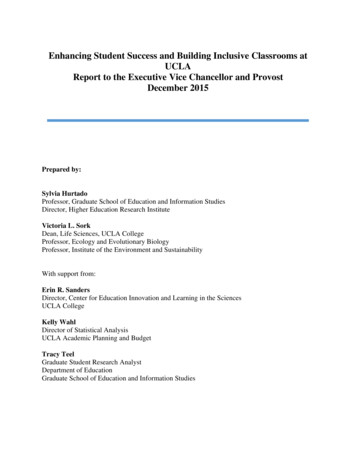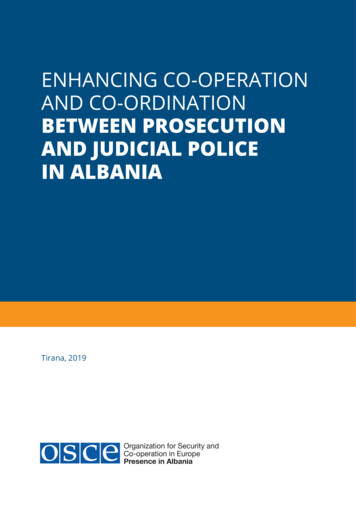
Transcription
ENHANCING CO-OPERATIONAND CO-ORDINATIONBETWEEN PROSECUTIONAND JUDICIAL POLICEIN ALBANIATirana, 2019
ENHANCING CO-OPERATION ANDCO-ORDINATION BETWEEN PROSECUTIONAND JUDICIAL POLICE IN ALBANIA“Every brick has its own place to build a wall.” (JPO services)Tirana, 2019Author:Rositsa ZaharievaInternational Consultant All rights reserved. The contents of this publication may be freely used andcopied for educational and other non-commercial purposes, provided that anysuch reproduction is accompanied by an acknowledgement of the OSCE as thesource.The views expressed in this publication are those of the author and do not necessarily reflect the official position of the OSCE Presence in Albania.
ContentsExecutive Summary .6Abbreviations. 81. Introduction and Background.91.1 Methodology.102. Legal Framework.122.1 Prosecution Office of Albania.122.1.1 Status of prosecutors.122.1.2 Structure and organisation of prosecution office.132.1.3 Role of prosecutors in criminal proceedings.142.2 Judicial Police in Albania.142.2.1 Status of judicial police officers.142.2.2 Structure and organisation of Judicial Police.162.2.3 Role of Judicial Police in Criminal Investigations.163. Procedural Mechanisms, Formal and Informal Cooperation Practices .173.1 Methodological and Functional Subordination of Judicial Police .173.2 Role of prosecution in the career development of judicial police officers.173.3 Establishment of joint permanent and ad hoc teams .183.4 Written Orders and Informal Communication.184. Analysis of findings from the questionnaires and interviews administeredby OSCE PiA.194.1 General Issues Pertaining to Cooperation, Coordination, Collaboration andCommunication in Criminal Proceedings.194.2 Roles during Investigations.254.3 Leadership .274.4 Chain of Command.294.5 Investigation Strategy.304.6 Investigation Follow-Up.324.7 Investigation and Evidence Gathering .324.8 Reporting.344.9 Gender .354.10 Training and Guidelines.365. Summary of the main findings .386. Recommendations .416.1 Actions at legislative and regulatory level.416.2 Actions at organisational level.426.3 Capacity building and capacity development actions.427. References.437.1 Bibliography.437.2 Legal instruments.43
Executive SummarySome major legislative developments marked the launch of the justice reform in Albania. Further tothe Constitutional amendments in 2016, and the amendments to the Criminal Procedure Code in2017, new laws on the status of judges and prosecutors and on organisation and functioning of theprosecution office provided strong legal guarantees for prosecutorial independence and assertedthe leading role of prosecutors in criminal investigations. The recent law on the organisation andfunctioning of the judicial police introduced major organisational changes to improve the investigative role of judicial police officers and affirm prosecutors’ leadership.The findings and recommendations on the implementation of the EU aquis suggest further strengthening the capacities of Albanian institutions in the area of the rule of law. Moreover, the observations of OSCE PiA on the dynamics of the interaction between prosecutors and judicial policeindicate that yet a large number of prosecutors do not play a leading or proactive role during theinvestigative stage of criminal proceedings, thus leaving the judicial police to their own means andmaking their role in preliminary investigation more difficult. Overall, the current situation impactsthe successful prosecution and adjudication of criminal cases and particularly – of those on corruption related offences.The purpose of this study is to examine and analyse the current status of the cooperation, coordination, and communication between the prosecution and judicial police in Albania in order to establishthe existing normative, professional and behavioural problems and to make recommendations forshort term action and long term strategies.The study provides an overview of the legal framework pertaining to (i) the status of prosecutors andjudicial police officers, (ii) the structure and organisation of the prosecution office and the respectivestructures and organisation of judicial police in services and in sections, and (iii) the role of prosecutors and of judicial police in criminal investigations.Next, the study looks at the existing procedural mechanisms and formal and informal cooperationpractices between prosecution and judicial police. More specifically, it looks into the functional subordination of judicial police and the existing legal possibilities for the prosecution to afford methodological guidance and to play a role in the career development of judicial police officers. Attentionis given to joint teams – both permanent and ad hoc, as a tool to achieve better investigative resultsthrough improved cooperation and coordination. Lastly, this section deals with the communicationpractices between prosecutors and judicial police officers.Based on the results from the outcome of questionnaires and interviews, this study examines theviews and opinions of both prosecutors and judicial police. The analysis is structured around thefollowing thematic areas, focusing specifically on: (i) the general issues pertaining to the cooperation, coordination, collaboration and communication between prosecutors and judicial police, interalia the phenomenon of rotation of judicial police on services, the existing lack of trust and com-6ENHANCING COOPERATION AND COORDINATION BETWEEN PROSECUTION AND JUDICIAL POLICE IN ALBANIA
mon goals between the various actors, the issues related to confidentiality of investigation, and theproblems related to the quality of work (ii) the roles of judicial police in services and in sections incriminal investigations, (iii) prosecutorial leadership and the current difficulties in understandingand exercising this role (iv) the effect of the dual chain of command currently existing for the judicialpolice officers in the State police, (v) investigation strategy, and in particular how case prioritisationis applied (vi) investigation follow-up, (vii) evidence gathering, with a focus on the access to electronic databases, (viii) quality of reporting, (ix) gender issues, and (x) training and guidelines. Theanalysis also examines these features in the light of the specificities pertaining to the investigationof corruption-related offences.The analysis of the legal framework and the outcome of the questionnaires and interviews leadsto a series of findings. While the applicable laws enable for a strong prosecutorial leadership, warranted by multiple legal safeguards to prosecutors’ independence, the existing professional attitudeof many prosecutors still limits their involvement to supervision of preliminary investigation withlittle or no initiative, except in the most complex cases.The findings also reveal that judicial police in sections and in services are facing different challengeswhich in turn call for different solutions. On the one hand, the ability of judicial police in servicesto conduct quality investigations in a timely manner is affected negatively by the lack of sufficientand skilled personnel, and the need to balance investigation with preventive police functions whilemanaging the expectations and sometimes conflicting priorities of two chains of command – thatof prosecutors and of the police chiefs. In that relation, the quality of reporting and gathering of admissible evidence comes out as a pressing issue in the work of judicial service police. On the otherhand, section police suffers from scarce operational and technical resources and more recently –motivation, after the 2019 law on judicial police came into force.Another key finding of the study is related to the cooperation issues stemming from the mistrustbetween prosecutors and judicial police, closely linked to the lack of common goals. Media publications based on police announcements lead to early disclosure of investigative secrets. While suchmedia announcements are possibly motivated by the desire to present police activities favourablyto the public, they create risks for the successful outcome of investigations, undue pressure on prosecution and ultimately violate the good relations between prosecution and police.Lastly, the study looks into the shortcomings related to the insufficient or inadequate training andthe lack of updated practical tools for prosecutors and judicial police officers, such as manuals, SoPs,checklists, guidebooks, and outlines the most relevant areas for intervention both for local and international stakeholders.The study provides recommendations for future actions divided in accordance with the relevantareas of intervention: at legislative and regulatory level, at organisational level and capacity buildingand capacity development actions.ENHANCING COOPERATION AND COORDINATION BETWEEN PROSECUTION AND JUDICIAL POLICE IN ALBANIA7
AbbreviationsCCPCode of Criminal Procedure of AlbaniaCMSCase Management SystemDSIKNational Security AgencyEUEuropean UnionFIUFinancial Intelligence UnitGPOGeneral Prosecutor’s OfficeHIDAACI High Inspectorate of Declaration and Audit of Assets and Conflict of InterestJPCJudicial Police CommissionJPOJudicial Police Officer(s)MoUMemorandum of UnderstandingNBINational Bureau of InvestigationPiAPresence in AlbaniaOSCEOrganisation for Security and Co-operation in EuropeSISState Intelligence ServiceSoMSchool of MagistratesSoPStandard Operating ProcedureSPAKSpecial Prosecution against Corruption and Organized CrimeSPOSpecial Prosecution OfficeSCPOSerious Crimes Prosecution OfficeTIMSTotal Information Management SystemUNODC United Nations Office on Drugs and Crime8ENHANCING COOPERATION AND COORDINATION BETWEEN PROSECUTION AND JUDICIAL POLICE IN ALBANIA
1. Introduction and BackgroundThe process of the justice reform in Albania commenced in 2016 with adopting amendments to theConstitution of Albania (hereafter “The Constitution”) aiming to establish an independent and selfgoverning judiciary and to strengthen the legislative framework to fight corruption more effectively.The so-called “justice reform package” following the Constitutional amendments, included inter aliaLaw No 95/2016 on the Organization and Functioning of Institutions for Combating Corruption andOrganized Crime, Law No 96/2016 on the Status of Judges and Prosecutors in the Republic of Albania, (hereafter referred to as “Law on the Status of Judges and Prosecutors”), Law No. 97/2016on the Organisation and Functioning of the Prosecution office in the Republic of Albania (hereafterreferred to as “Law on the Organisation and Functioning of the Prosecution office”). In 2017 amendments were introduced to the Code of Criminal Procedure of Albania (CCP) increasing the autonomyof prosecutors and strengthening their leading role in the investigative stage of criminal proceedings. The adoption of Law No.25/2019 on the Organization and Functioning of the Judicial Police(hereafter “Law on Judicial Police”) in 2019 further aimed to improve the structural and functionalorganisation of judicial police and reaffirmed the role of the prosecutor as the leader of preliminaryinvestigation.These measures were recognised as steps taken ‘to improve cooperation and mutual trust betweenpolice, prosecutors and other relevant agencies and bodies to detect and investigate complex criminal cases’. While it was acknowledged that Albania has made progress in successful prosecutionof low and medium level corruption, there has been no significant progress in the prosecution ofhigh-level state officials. 1The current Report is prepared in the framework of the 2019 project on “Supporting justice institutions and legislative process in Albania” of the Rule of Law and Human Rights Department of OSCEPresence in Albania (PiA). One of the components of this project is focusing on prosecution-policecooperation in the investigative stage of criminal proceedings. The Report looks to identify the mostrelevant normative, organisational or behavioural issues affecting the interaction between prosecutors and judicial police officers in Albania.The Report does not intend to provide a set of recommendations for improving justice institutionsor the legislative process from a general perspective, but to focus exclusively on the shortcomingsof the existing formal procedures and informal practices in the investigative stage of the criminalproceedings with the aim to improve communication, cooperation and coordination for effectivelycarrying out criminal investigations.The process of preparing the Report on “Enhancing Cooperation and Coordination between Prosecution Office and Judicial Police in Albania” allowed many criminal justice practitioners to sharetheir views, express concerns and suggest changes. The Report only incorporated those opinionsthat were deemed relevant to its main topic. Many valuable comments and proposals were sharedand duly noted to be further addressed in the course of other initiatives undertaken by the Rule ofLaw and Human Rights Department of OSCE PiA.The Report is intended for the prosecutors and judicial police officers in Albania, prosecutors in theGeneral Prosecutor’s Office, the High Prosecutorial Council, the Judicial Police Commission, the Ministry of the Interior and other relevant governmental agencies and bodies.1 Commission Staff Working Document Albania 2019 Report, Brussels, 29.5.2019 SWD (2019) 215 final.ENHANCING COOPERATION AND COORDINATION BETWEEN PROSECUTION AND JUDICIAL POLICE IN ALBANIA9
1.1 MethodologyThe process of developing this Report commenced with a review and assessment of the legislativeframework currently in force that regulates and affects the cooperation between prosecution andjudicial police in Albania. That includes any primary and secondary legislation as well as other available regulatory documents. The sources for this are unofficial translations into English language ofacts provided by the General Prosecution Office (GPO), Police authorities, and other official sources.As a next step, the Rule of Law and Human Rights Department team of OSCE PiA reviewed relevantliterature2 and developed one questionnaire for prosecutors and one for judicial police officers. Thequestionnaires contained more or less the same questions with only very little differences. In total,there were 263 questions for the prosecutors and 262 questions for the judicial police, clustered inthe following thematic sections: General Issues Pertaining to Cooperation, Coordination, Collaboration and Communication in Criminal Proceedings;Roles during Investigations;Leadership;Chain of tion Strategy;Investigation Follow-Up;Investigation and Evidence Gathering;Reporting;Information Sharing/Consultation;Gender Issues;Training and Guidelines;Investigation of Corruption related Offences.The questionnaires were administered to seven prosecution offices (Tirana, Vlore, Shkoder, Durres,Fier, Elbasan and the Serious Crimes Prosecution Office (SCPO)) and six police directorates in theregion of Tirana (including SCPO), Vlore, Shkoder, Durres, Fier and Elbasan. A total of 140 questionnaires for prosecutors and 234 questionnaires for judicial police officers were administered andreceived. The findings of the questionnaires were processed and analysed, and the results are presented in a Statistical Report3, which is structured according to the thematic sections of the questionnaires. The findings pertaining to investigation of corruption related offences are reflected in therelevant sections depending on the specific topic in question.The preliminary findings and working hypotheses resulting from the desk study of the legislativeframework and the findings of the questionnaires were used to develop semi-structured questionsfor personal anonymous interviews with focus groups of prosecutors and judicial police officersfrom the above mentioned prosecution offices and police directorates. The interviews aimed tocollect the participants’ accounts of their actions, experiences and thoughts related to the topicof the Report. The questions presented were mostly open ended to enable the interviewer to addsupplementary questions according to the received responses. Informed consent for the recordingof the responses was obtained while presenting the objectives of the Report, confidentiality and theprocedure.It must be highlighted that the methodology of the Report did not foresee administering the questionnaire or conducting interviews with judicial police officers in services other than the state policeof Albania. Nevertheless, reference to those is made in the Report on the basis of information provided in the interviews.2 See Section 7.1 Bibliography.3 The Statistical Report with the results and findings from the questionnaire (hereafter “The Statistical Report”) is available inelectronic format as an Annex to this Report.10ENHANCING COOPERATION AND COORDINATION BETWEEN PROSECUTION AND JUDICIAL POLICE IN ALBANIA
In addition, a small number of semi-structured interviews with stakeholders outside of the prosecution and police system took place in the end of the process of collecting background information.The aim of these interviews was to assess the findings in a larger context and to compare them withthe experience and perceptions of external parties when it comes to cooperation and collaborationbetween prosecution and judicial police.The Report is structured as follows:Section 1 introduces the scope and background to the Report and outlines the methodology.Section 2 reviews the existing legal framework relevant to the Report with a particular emphasisof the status of prosecutors and judicial police, the organisational structure of the respectiveentities and the roles of prosecutors and judicial police officers in criminal investigations.Section 3 examines the procedural mechanisms, as well the existing formal and informal cooperation practices.Section 4 provides an analysis of the relevant findings from the questionnaires and interviewsheld by OSCE PiA.Section 5 presents the main findings of the Report.Section 6 contains recommendations.ENHANCING COOPERATION AND COORDINATION BETWEEN PROSECUTION AND JUDICIAL POLICE IN ALBANIA11
2. Legal FrameworkThe present section of the Report is elaborated on the basis of the respective provisions of the Constitution, CCP, Law No 95/2016 on the Organization and Functioning of Institutions for CombatingCorruption and Organized Crime, the Law No 96/2016 on the Status of Judges and Prosecutors, theLaw No 97/2016 on the Organisation and Functioning of the Prosecution office, Law No 108/2014 onState Police, and Law No 25/2019 on Judicial Police.In addition, a number of sublegal acts were provided for analysis for the purposes of the Report.4While the Law on the Organisation and Functioning of the Prosecution Office specifies that such actsadopted before the entry into force of the Law remain applicable if they do not conflict with it, a highdegree of caution was applied when it comes to their assessment due to the generally unclear statusof their application. Such considerations were not given to regulatory acts issued after the enteringinto force of the law. Moreover, no sublegal acts issued pursuant to the Law on Judicial Police andthe Law on the Status of Judges and Prosecutors were made available for consideration.2.1Prosecution Office of Albania2.1.1 Status of prosecutorsThe Constitution proclaims the “internal independence of the prosecutors to investigate and prosecute, in accordance with the law”.5 The independent status of prosecutors is further reflected inthe CCP and the Law on the Status of Judges and Prosecutors in Albania which ends the earliermonocratic system in the functioning of Albanian prosecution and affirms that the exercise of thefunctions shall be based on “the assessment of the facts and interpretation of the law, in accordancewith [the prosecutor’s] intrinsic conviction, free of any extraneous influences, direct or indirect, fromany side and for any reason.” 6 In that regard the Constitution and the laws adhere to the relevant European standards that “the independence of prosecutors is not a prerogative or privilege conferredin the interest of the prosecutors, but a guarantee in the interest of a fair, impartial and effectivejustice that protects both public and private interests of the persons concerned.”7With the new law prosecutors enjoy full independence when it comes to making decisions whetherto prosecute and for what charges, which are subject only to judicial control. Higher prosecutorshave the authority to ensure proper administration of the system and consistency in the applicationof the law but cannot interfere with the decisions of prosecutors in concrete cases.The General Prosecutor issues general instructions in writing for the prosecutors of the prosecutionoffices of general jurisdiction and oversees their implementation. The General Prosecutor may issuesuch instructions for (i) the coordination of work between different prosecution offices or betweenthem and the judicial police, involved in common investigations; (ii) ensuring the uniform application of law and criminal prosecution, based on judicial decisions; (iii) ensuring the implementation ofrecommendations of the Council of Ministers on the fight against crime; and (iv) other issues not related to concrete cases. Heads of prosecution offices have the authority to issue general instructionson organisational matters addressed to the prosecutors in their respective offices, while the ChiefSpecial Prosecutor will be competent to issue such instructions for the prosecutors of the SpecialProsecution against Corruption and Organized Crime (SPAK) (after its establishment).Exceptionally, heads of prosecution offices may issue instructions in specific cases however theseare always non-binding and reasoned.As a safeguard to the functional independence of prosecutors, the law foresees a system to chal4 For the full list of sublegal acts, please see Section 7.1 “Legal Instruments”5 Constitution, Article 148 para 2.6 CCP, Article 25 para 2; Law on the Status of Judges and Prosecutors, Article 3 para 2.7 See CCPE Opinion No. 9(2014) on European norms and principles concerning prosecutors, para 38-39.12ENHANCING COOPERATION AND COORDINATION BETWEEN PROSECUTION AND JUDICIAL POLICE IN ALBANIA
lenge both general instructions and instructions in specific cases: the former by means of appeal tothe High Prosecutorial Council, and the latter by requesting further explanation and decision of theindividual prosecutor not to follow.In addition to the measures ensuring the organisational independence of prosecutors, a set of clearrules for recruitment, appointment, transfer, promotion and secondment guarantee their functionalindependence.82.1.2 Structure and organisation of prosecution officeThe Prosecution Office of Albania is organised and functions attached to the judicial system. Therules for its organisation can be found in the Constitution and in the Law on the Organisation andFunctioning of the Prosecution office.The highest-ranking office in the prosecutorial structure is the GPO headed by the General Prosecutor of Albania. The GPO has jurisdiction over the entire territory of Albania in the prosecutionof cases against the President of the Republic, the Prime Minister and members of the Council ofMinisters, deputy ministers, judges of the Constitutional Court and judges of the Supreme Court.A number of prosecution offices attached to first instance courts (commonly referred to as Districtprosecution offices) and prosecution offices attached to courts of appeal exercise general jurisdiction coinciding with the jurisdiction of the respective courts.Currently there are also two prosecution offices with special jurisdiction – SCPO, attached to theSerious Crimes Court of first instance and the respective SCPO attached to the Serious Crimes Courtof Appeal. The SCPO is competent over cases of corruption and organized crime, e.g. crimes perpetrated by organised criminal groups, terrorist organisations and crimes of high-level state officials,as well as judges, prosecutors, justice officials.Temporary Special Sections are established in the SCPO, and in the District prosecution offices inTirana, Durres, Elbasan, Shkoder, Vlora, Fier, Korca. Gjirokastra and Lezha9, dealing with cases oforganised crime, economic crime and corruption, crime in the area of narcotic substances, moneylaundering and crimes committed by high-level officials (as defined in Article 132/2 of the Constitution). Given the importance of the investigations assigned to the special sections, there are someprovisions to meet their extra needs, e.g. special office space, special support services and provisions to avoid disclosures of investigative secret (i.e. materials shall be sent directly, sidesteppingthe postal services).The Constitution foresees one specialised prosecutorial structure, i.e. the Special Prosecution Office(SPO). The SPO is independent from the General Prosecutor and exercises criminal prosecution andrepresents accusation before the Special Anti-Corruption and Organised Crime Courts as well asbefore the High Court. The SPO is competent in cases of corruption and organized crime, in casesagainst high level officials, such as the President of the Republic, Speaker of the Parliament, thePrime Minister, members of the Council of Ministers, judges of the Constitutional Court and HighCourt, the General Prosecutor, the High Justice Inspector, mayors, members of the Parliament, deputy ministers, members of the High Judicial Council and High Prosecutorial Council, and directors ofcentral or independent institutions defined in the Constitution or in law, as well as charges againstformer officials as mentioned above.10The SPO, together with an independent investigation unit, the National Bureau of Investigation (NBI),shall form the Special Anti-Corruption and Organised Crime Structure (SPAK). The establishment ofSPO, as well as the establishment of NBI, are currently ongoing. 11As soon as SPO is constituted, the SCPO will cease to exist. The cases investigated by the SCPO shallbe transferred to the SPO if they fall under its jurisdiction pursuant to article 75a CCP, or
CCP Code of Criminal Procedure of Albania CMS Case Management System DSIK National Security Agency EU European Union FIU Financial Intelligence Unit GPO General Prosecutor's Office HIDAACI High Inspectorate of Declaration and Audit of Assets and Conflict of Interest JPC Judicial Police Commission JPO Judicial Police Officer(s)
